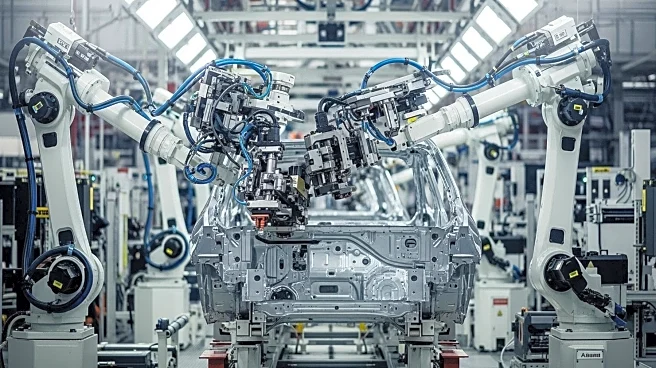What's Happening?
The automotive industry is currently facing significant challenges due to global supply chain vulnerabilities exacerbated by U.S. immigration enforcement actions. Recent raids by Immigration and Customs Enforcement (ICE) have disrupted labor-intensive sectors such as semiconductors, steel, and logistics, leading to increased operational risks. For instance, Hyundai's decision to halt operations at its Georgia electric vehicle plant following an ICE raid highlights the fragility of cross-border operations. These disruptions are compounded by existing tariffs on Canadian and Mexican goods, which destabilize North American supply chains. Automakers are responding by recalibrating production strategies, including nearshoring and automation, to mitigate these risks.
Why It's Important?
The intensification of U.S. immigration enforcement and the resulting labor shortages pose significant risks to the automotive industry, a key sector in the U.S. economy. The semiconductor industry, crucial for automotive manufacturing, faces a projected shortage of 67,000 skilled engineering roles by 2030. Rising labor costs and compliance expenses are expected to increase by 15-20%, impacting profitability. Companies with robust resilience strategies, such as Toyota and Honda, are better positioned to navigate these challenges. Their ability to diversify supply chains and invest in automation provides a competitive advantage, making them more attractive to investors.
What's Next?
Automakers are likely to continue investing in resilience strategies, such as diversifying supply chains and enhancing automation, to mitigate the impact of labor shortages and tariffs. The industry may also see increased collaboration with government agencies to address immigration-related challenges. Companies that successfully adapt to these changes will likely emerge as leaders in the automotive sector, while those that fail to do so may face significant financial losses.
Beyond the Headlines
The current situation underscores the importance of resilience as a core competency in the automotive industry. Companies that prioritize strategic resilience across financial, operational, and digital dimensions are better equipped to withstand volatility. This focus on resilience not only mitigates risks but also drives innovation and long-term growth, positioning these companies as leaders in the evolving automotive landscape.









